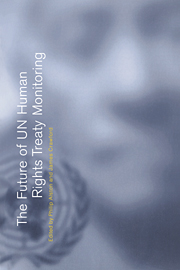Book contents
- Frontmatter
- Contents
- List of Tables, Figure, Appendices
- Notes on Contributors
- Editors' Preface
- Table of Treaties
- Table of Cases
- List of Abbreviations
- 1 The UN human rights treaty system: A system in crisis?
- A The UN human rights monitoring system in action
- B National influences and responses
- C Regional and sectoral comparisons
- D Common challenges for the treaty bodies
- 18 The problem of overlapping among different treaty bodies
- 19 Bodies of knowledge: A diversity promotion role for the UN High Commissioner for Human Rights
- 20 Treaty bodies responding to states of emergency: The case of Bosnia and Herzegovina
- 21 Ensuring effective supervisory procedures: The need for resources
- 22 Servicing and financing human rights supervision
- E Looking to the future
- Index
20 - Treaty bodies responding to states of emergency: The case of Bosnia and Herzegovina
Published online by Cambridge University Press: 23 December 2009
- Frontmatter
- Contents
- List of Tables, Figure, Appendices
- Notes on Contributors
- Editors' Preface
- Table of Treaties
- Table of Cases
- List of Abbreviations
- 1 The UN human rights treaty system: A system in crisis?
- A The UN human rights monitoring system in action
- B National influences and responses
- C Regional and sectoral comparisons
- D Common challenges for the treaty bodies
- 18 The problem of overlapping among different treaty bodies
- 19 Bodies of knowledge: A diversity promotion role for the UN High Commissioner for Human Rights
- 20 Treaty bodies responding to states of emergency: The case of Bosnia and Herzegovina
- 21 Ensuring effective supervisory procedures: The need for resources
- 22 Servicing and financing human rights supervision
- E Looking to the future
- Index
Summary
Introduction
The 1990s have been years of innovation for the UN human rights treaty bodies. Though the extent and nature of the developments differ from committee to committee, there is a clear pattern of effort towards greater effectiveness in implementing their respective mandates. This activism, however, creates new expectations as to the capacity and will of the committees to move forward.
In the same period, the crises of the former Yugoslavia and of Bosnia and Herzegovina in particular have served as a measure by which the treaty bodies could evaluate their effectiveness in addressing emergency situations. The region has provided the occasion for some of the more significant of the committees' procedural developments. The challenge represented by Bosnia and Herzegovina for the treaty bodies has by no means ended with the Dayton-Paris Agreement. The present chapter examines the interaction between the treaty bodies and Bosnia and Herzegovina, identifying and evaluating innovative actions while noting some of the unmet challenges. In each case, the focus of attention is on issues of systemic significance for the work of the treaty bodies.
Reporting procedures
Routine application of the reporting process clearly has little to offer as a contribution to the resolution of emergency situations. The process should either be disregarded as irrelevant or refashioned. Among those treaty bodies which have addressed emergency situations some have chosen the second option. Their refashioning, in the context of former Yugoslavia and Bosnia and Herzegovina, has focused on four principal issues.
- Type
- Chapter
- Information
- The Future of UN Human Rights Treaty Monitoring , pp. 439 - 460Publisher: Cambridge University PressPrint publication year: 2000



